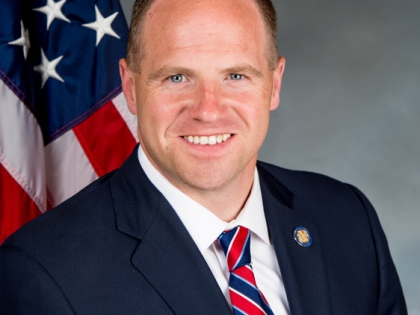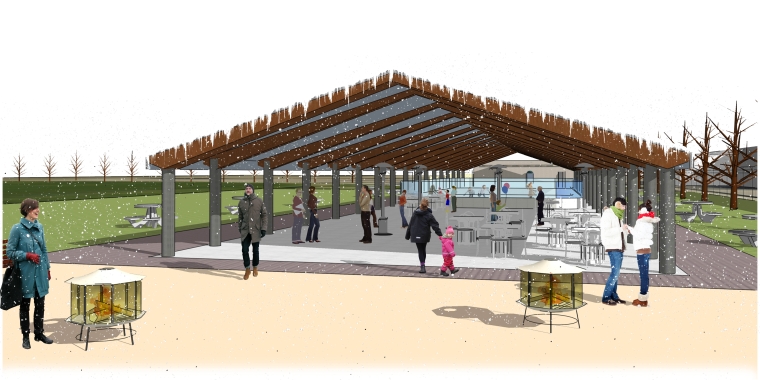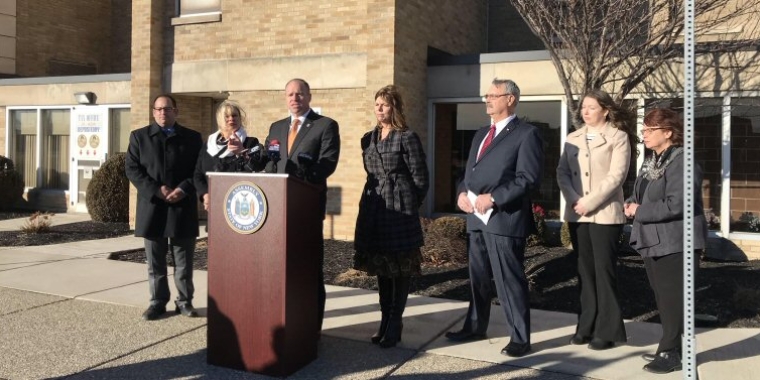
Senator Kennedy Confident State Review of Crude Oil Rail Safety Will Prevent Emergencies, Make Communities Disaster Ready
Timothy M. Kennedy
January 29, 2014
-
ISSUE:
- Transportation
Following December’s train derailment in Cheektowaga, Kennedy urged state review of disaster readiness and safety policies governing the transport of crude oil by rail.
Volume of crude oil shipped by rail has skyrocketed in recent years. An estimated 100-200 outdated DOT-111 rail cars carrying crude oil travel through WNY daily.
CHEEKTOWAGA, N.Y. – Today, the state announced a full-scale review of disaster preparedness and safety procedures related to the shipment of crude oil via rail across wide swaths of Upstate New York. The state’s review follows Senator Tim Kennedy’s request in December that the state take steps to ensure communities along railroads – such as Buffalo, Cheektowaga and Lackawanna – are kept safe from any potential harm posed by emergency situations involving crude oil shipped by rail.
In December, following a train derailment in the Town of Cheektowaga, Senator Kennedy, a member of the Senate Transportation Committee, called on the state to conduct a review of disaster preparedness and safety protocols overseeing the shipment of crude oil and other hazardous materials by rail. Governor Andrew Cuomo announced today an executive order directing the state to embark on a top-to-bottom review of rail safety – which will be due back to the Governor by April 30, 2014.
In recent years, the amount of crude oil shipped by rail has skyrocketed. In 2008, just 9,500 carloads of U.S. crude oil were shipped by rail, while last year, the number climbed way up to 234,000 carloads, according to the Association of American Railroads. With more and more crude oil moving by rail, Kennedy says state’s review will help ensure strong precautions are in place to prevent derailments and respond appropriately to train emergencies or disasters.
“Whenever a train falls off the tracks, it’s a scary sight for anyone who lives near rail lines. When a train carrying crude oil derails in your own backyard in Cheektowaga, it sets off an alarm that New York State must ensure our communities are protected from any potential dangers, especially considering the surge in oil shipped by rail,” said Senator Tim Kennedy. “Active railroads are good news for industry and for the operators of local rail lines, but Western New Yorkers deserve to know that their families, their homes and their livelihoods are not being put in danger by crude oil traveling in tanker cars through Buffalo, Cheektowaga and across the state. This state review will help assure local families that appropriate precautions are in place to prevent derailments and that the state is ready and prepared in the event of a freight-rail emergency.
“Thank you to Governor Cuomo for directing the state to take necessary actions that will improve rail safety and ensure our community remains safe,” Kennedy added. “I also want to commend the work of Senator Schumer who has been a leader in pushing for freight rail safety.”
Senator Kennedy joined U.S. Senator Charles Schumer in August at a location near December’s derailment in Cheektowaga to advance efforts to get safer freight rail cars on the tracks running through New York. Senator Schumer has been pushing to get the U.S. Department of Transportation to require freight rail carriers to retrofit or phase out DOT-111 tank cars. The flawed and out-of-date DOT-111 tank car has proven susceptible to tearing and spilling hazardous materials during a derailment.
In a December letter to the state DOT following the Cheektowaga derailment, Kennedy outlined the need for a full review of safety policies related to freight rail traveling across the state. Kennedy pointed out that Western New York had seen more than one derailment in 2013, citing an earlier derailment on Buffalo’s East Side.
“In recent months, the state has seen a dramatic increase in the volume of crude oil shipped through New York State by ship and rail,” Kennedy wrote in his letter. “This growth has certainly led to an increase in jobs, which is a great boost to the local economy, but we should also make sure the state is implementing appropriate safety measures. Freight rail lines transporting crude oil stretch through wide swaths of Upstate New York, and it is essential that appropriate safety procedures are in place to ensure tragedies are prevented and the state is prepared to respond in the case of an emergency.”
For full details on the state review, visit: http://www.governor.ny.gov/press/01292014-crude-oil-rail-safety.
A copy of Senator Kennedy's letter can be viewed at this link, and the full text is below.
###
Senator Timothy M. Kennedy represents the New York State Senate’s 63rd District, which is comprised of the towns of Cheektowaga, the city of Lackawanna and nearly all of the city of Buffalo. More information is available at http://kennedy.nysenate.gov.
FULL TEXT OF SENATOR KENNEDY’S TO NYSDOT:
December 12, 2013
Commissioner Joan McDonald
NYS Department of Transportation
50 Wolf Road
Albany, NY 12232
Dear Commissioner McDonald:
In light of a recent derailment incident in Cheektowaga, I write to request that the New York State Department of Transportation conduct a thorough review of the state's freight rail procedures and emergency preparedness. On December 10, five rail cars carrying crude oil to Philadelphia derailed. Three of these cars flipped over, while two remained upright. We were very fortunate that no oil was spilled, and there were no injuries or loss of life. However, in light of recent incidents such as the disaster that occurred last year in Lac-Mégantic, Quebec, this type of accident must be taken very seriously.
Buffalo and Cheektowaga are densely populated residential areas that are seeing more and more trains carrying crude oil travel directly through their neighborhoods every year. This is not the first time we have seen a tanker car derail in Western New York – a similar situation occurred on the East Side of Buffalo earlier this year when several cars carrying ethanol derailed. If residents are to feel comfortable with this sort of cargo going through their backyards, they must have reassurances that the errors that led to these recent derailments will not happen again. I implore you to make this review a top priority, and for it to be conducted with as much transparency and public input as possible.
As U.S. Senator Charles E. Schumer pointed out earlier this year when he visited Cheektowaga, the rail cars that are generally used to transport oil through New York State are the same design, DOT-111, as the ones that exploded in Quebec, and we must take every accident involving this model, no matter how minor, very seriously. I am sure you understand why my constituents and I take this issue so seriously.
In recent months, the state has seen a dramatic increase in the volume of crude oil shipped through New York State by ship and rail. Oil fields in Canada and the Midwest are producing thousands and thousands of barrels of oil every day, and about 100 to 200 DOT-111 cars carrying crude oil and between 80 and 100 cars carrying ethanol pass through Buffalo and Western New York each day, according to published reports. This growth has certainly led to an increase in jobs, which is a great boost to the local economy, but we should also make sure the state is implementing appropriate safety measures. Freight rail lines transporting crude oil stretch through wide swaths of Upstate New York, and it is essential that appropriate safety procedures are in place to ensure tragedies are prevented and the state is prepared to respond in the case of an emergency.
In light of this surge in rail activity, I believe you must review the state's protocols governing crude oil and other flammable materials transported by freight rail across Upstate New York and ensure proper precautions and procedures are in place to prevent or respond to emergencies. New Yorkers need to know that their communities will be kept safe, and, should the unexpected happen, that the state is well-prepared to take action quickly and appropriately.
Again, this review must be thorough, speedy, and ought to take into account the safety of rail workers and residents alike. Thank you for you your attention to this important matter. If I can be of assistance or if you have any questions, please contact me in my district office at 716.826.2683.
Sincerely,
Timothy M. Kennedy
Share this Article or Press Release
Newsroom
Go to Newsroom

